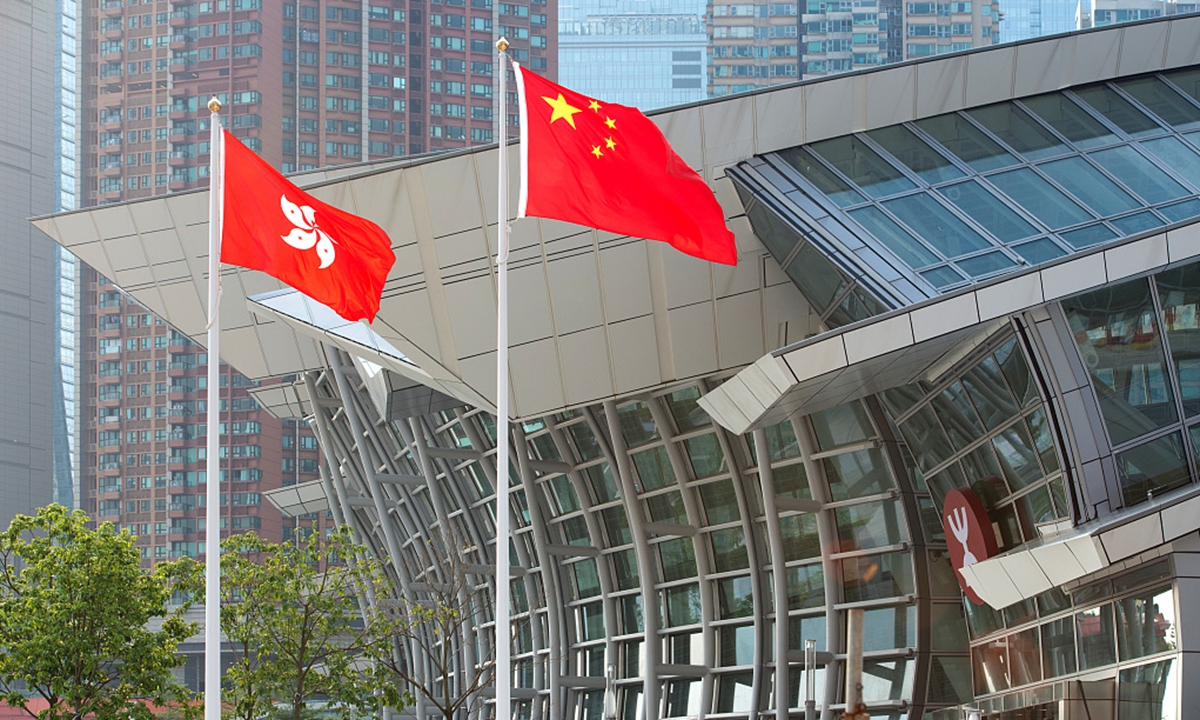China slams looming sanctions on officials in HK
By Chen Qingqing and Fan Lingzhi Source: Global Times Published: 2020/12/7 21:15:42
Playing Hong Kong card anticipated; Biden has room to adjust: expert

Hong Kong Photo: VCG
Several Chinese officials and prominent academics on Hong Kong affairs said the looming US sanctions on at least 12 Chinese officials would not be as meaningful as several Hong Kong-related bills passed by the US Congress since the social turmoil in the Chinese city in 2019. Those so-called punitive moves made by Washington are purely political gestures.
Following media reports that the US government has been mulling new sanctions on at least 12 Chinese officials for the recent disqualification of Hong Kong Legislative Council (LegCo) lawmakers, Chinese Foreign Ministry spokesperson Hua Chunying reiterated China's position against US interference in China's internal affairs through Hong Kong-related issues, which Hua said has always been obvious.
Reuters reported on Monday that the US is preparing to impose sanctions on at least a dozen Chinese officials "over their alleged role" in the disqualification of some lawmakers in Hong Kong, and the move will target Communist Party of China (CPC) officials, including those from the National People's Congress (NPC), China's top legislature. The measures include freezing their assets and financial sanctions, Reuters said, citing unnamed sources.
"The so-called sanctions have yet to be announced," Hua said at the routine press conference on Monday, noting that if the media report turns out to be true, China's position is obvious.
Since the social turmoil was triggered by anti-government protests in Hong Kong in 2019, American lawmakers has come up with measures in reaction to the national security law for Hong Kong, including signing the Hong Kong Autonomy Act, imposing sanctions on Hong Kong officials, and removing Hong Kong's special status. Those moves were considered blatant interference of the US government into China's internal affairs, though some have had limited impact on individuals and institutions. They have failed to shake the determination of Chinese officials - both in the mainland and in Hong Kong - to push forward the national security law for Hong Kong, helping the city restore social stability.
Although the reported US sanctions did not identify Chinese officials from the NPC, Tam Yiu-chung, a member of the Standing Committee of the NPC, told the Global Times on Monday "there's no need to worry." As a Chinese lawmaker who recently took part in voting to pass arrangements that included the standards for disqualifying Hong Kong LegCo lawmakers, Tam reiterated that, like other Chinese lawmakers, they all believe they have been doing the reasonable and legitimate things to protect the long-time prosperity of Hong Kong.
"Still, given the global influence of the US financial system, the sanctions may cause some inconvenience for individuals," Tam said.
Carrie Lam, chief executive of the HKSAR government, recently revealed that she can't use a bank account as she was among 11 officials sanctioned in August by the US, which is seen by industry observers as a reminder that China's national sovereignty and security is at stake with US dominance in global financial transactions.
However, we firmly believe in our strong motherland, and US interference, once again, showed its hegemony, which should be rejected, Tam noted.
The US sanctions target the NPC decision in November to disqualify four opposition lawmakers who have infamous records for making troubles, and who are deemed unfit for their LegCo duties. China's top legislature also passed criteria that included the standards for disqualifying Hong Kong LegCo lawmakers, who will be disqualified from office as soon as they are determined by law to have failed to meet the legal requirements for upholding the Basic Law and honoring the pledge of allegiance to Hong Kong.
The Trump administration has been containing China by using the Hong Kong card, given a number of deeds and offensive rhetoric on Hong Kong matters. Reuters also reported that Hong Kong is "expected to be one of Biden's thorniest challenges" with the Chinese mainland.
The US Congress may probably come up with more Hong Kong-related acts, as some US politicians need to vent their resentment for failing to turn the Chinese city into a base to subvert China, while hoping to weaken the strategic value of Hong Kong for the Chinese mainland, particularly its economic and financial fields, Lau Siu-kai, vice-president of the Chinese Association of Hong Kong and Macao Studies, told the Global Times on Monday.
"We expect the US to make more moves on Hong Kong matters, unless Biden wants to ease tensions between China and the US," Lau said.
The Hong Kong-related laws give room to the Biden administration to interpret them depending on the needs of China-US relations, observers said, as Hong Kong could also be a tipping point for changing ties.
Posted in: HK/MACAO/TAIWAN